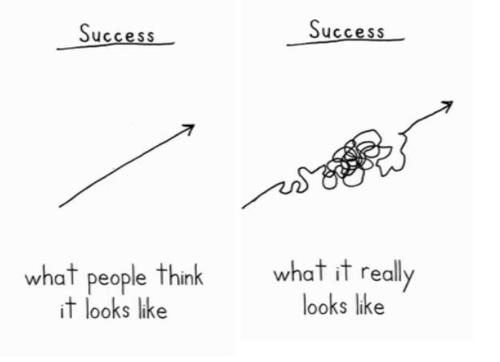Admit to having a fear of failure and people nod their heads in empathy; mention fear of success and you might as well be speaking in tongues.
I don’t understand this puzzled reaction because when I look around–and within–me, I see fear of success everywhere. We just fail to call it what it is.
It’s in the student who shows every sign of being a gifted musician, yet chooses biology as his major.
It’s in the employee who hangs back in the workplace, convinced he’s too inexperienced/busy/uncreative/overqualified/tired/out-of-the-loop to contribute more.
It’s in the person who hides behind cynicism and sarcasm, drowning in thoughts like “work is just a paycheck” and “the life I’d once imagined for myself was a child’s fantasy.”
It’s in the individual who dreams of having tens of thousands of people experience her writing who, after five thousand people read one of her heartfelt articles, stops writing altogether.
That last one? Yea, that would be me.
After having my first publication on elephant journal immediately tripling my personal goal of 1500 views, I went off the grid. I couldn’t write new essays. I couldn’t respond to reader emails. I could barely manage a tweet.
For three weeks.
It’s not that I hadn’t experienced “success” before. Believe me, this straight-A, Ivy League girl knows way more than she’d like about achievement.
However, put my genuine words before an audience. Words plucked from the ephemeral fog during a decade of still, private mornings. Words accustomed to fewer readers than appendages on my body. Words that had become overly comforted by rejection letters and I back down. Full force.
That’s the telltale characteristic of fear of success: the closer an activity lies to our core desires, the greater our likelihood of stepping back when even a whiff of accomplishment comes our way.
This feature masks fear of success from its owners and from everyone around them.
Yes, we can accept many accomplishments. Just not the ones we want most.
Rare is the person who can look the full glare of desired accomplishment in the face and not flinch.
Why We Fear Success
There should be no shame in admitting to fear of success, for when we lay out the reasons for it, it’s enough to make someone say, “Hey, who wouldn’t be afraid?!”
1. Anxiety and excitement feel physiologically similar, so many of us choose to actively avoid the excited feeling of success.
Psychologist Susanne Babbel claims this may be particularly true for people who have endured traumas. I’d suggest, though, that anyone who is tuned into their bodily reactions and internal states may become overwhelmed by the similarity, specifically putting introverts like me at risk.
2. We’re afraid of being disappointed, which stems from discomfort with vulnerability.
Instead of enjoying our desired successes as they come, we protect ourselves from being let down by perpetually feeling “foreboding joy,” according to sociologist Brene Brown.
3. We secretly believe we don’t deserve success.
The imposter syndrome is in full effect for many of us.
4. We’re privately uncomfortable with making others feel “lesser than.”
We all claim we want to be king of the mountain, but many of us only want that if it means there’s no one beneath us in the valley. Judith Shervan believes the “fear of being fabulous” comes from a commandment “to not break out beyond where you came from, to not really leave home.” She asserts that we have all been subjected to this, in some way, shape or form. The oft-cited quotation by Marianne Williamson on this topic is apt here: “Our deepest fear is not that we are inadequate. Our deepest fear is that we are powerful beyond measure.”
5. We fear the flipside of success.
This is a valid fear: artists and musicians often do experience the sophomore slump. The self-consciousness that comes with accomplishment blocks attempts at pure creation, resulting in work that is tepid, uninspired, and “safe.” A la countless second albums.
6. We don’t want to be criticized.
It’s generally true that the more eyes, the greater the likelihood of criticism. This links fear of success closely to fear of failure, making it difficult to tease them apart.
7. We don’t want to feel exposed.
There is no more naked feeling than saying, “Hey world, this is what I genuinely care about. This is what I truly want. This is what I’d sacrifice most anything to have.” It’s basically announcing, “Here’s the A-prime, this-can-be-my-undoing, defenseless spot on my body! And I’m not even going to attempt to protect it!” Yikes. Easier to hide behind cynicism, skepticism, and/or a self-deceiving veneer of “I have no clue what I want” than to come clean. Note I said easier. Not better.
How We Combat Fear of Success
With all of that working against us, what can we do?
We can battle fear of success by doing what we’re doing right here: naming it, calling it out and recognizing it within ourselves.
For when the fear of success remains hidden to ourselves, it acts as Plexiglas barrier between us and the work we need to be doing.
And then, once our fear is realized, we march on and overcome it.
We accept Williamson’s pronouncement: “Your playing small does not serve the world. There is nothing enlightened about shrinking so that other people won’t feel insecure around you.”
We admit our genuine desires aloud and find ways of dealing with the ripple (or crush) of anxiety that follows.
We ride the wave of achievement, even though we know it will inevitability buck us at the end.
We create as if no one is watching.
We build, in sum, the very life that we’re afraid of living. Because we know, deep down, that a life lived in accepted fear, but authentically, trumps even a moment lived in denial.
Love elephant and want to go steady?
Sign up for our (curated) daily and weekly newsletters!
Editorial Assistant: Livia Lay / Editor: Bryonie Wise
Photo: elephant journal archives







Read 0 comments and reply